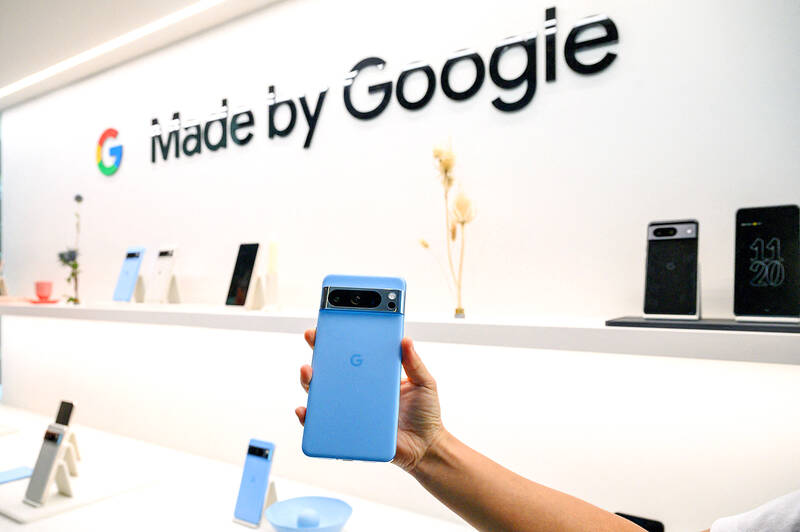Google on Wednesday said its latest premium-priced Pixel phone would have powerful generative artificial intelligence (AI) models running independently on the device, as the search engine giant seeks to lure buyers away from the latest iPhone.
The announcement by Google caps the autumn release season for big tech hardware that saw Apple Inc unveil the iPhone 15 series and Meta Platforms Inc officially launch its latest virtual reality headset.
Running on a powerful chip, Google’s Pixel 8 Pro would carry out some AI functions on the device itself instead of relying on transfers from cloud data centers that require heavy bandwidth.

Photo: AFP
At a launch event in New York, Google senior vice president of devices and services Rick Osterloh said the company’s AI teams had figured out how to “distill” AI models “into a version efficient enough to run on our flagship Pixel.”
This would greatly enhance existing AI tools on Pixel phones, such as removing blemishes or unwanted intrusions in photographs.
Later this on-device ability would expand to other AI features, Osterloh said.
Pixel phones would also begin testing an AI-amped assistant that would bring many of the abilities of Google’s ChatGPT-style AI assistant, Bard, onto the phone.
In time, the company said Bard would provide real-time help such as choosing the best path for a hike, sifting through e-mails or planning a birthday party. This would be handled through either spoken word, on-screen prompts or by using images, in a way similar to how the more powerful chatbots already work.
As with the other announcements, Google said that many of these AI powers were at an early phase and would be enhanced gradually.
Separately, Apple on Wednesday rolled out a software update to address an overheating issue that plagued some early buyers of the iPhone 15 Pro line.
The update, called iOS 17.0.3, is available as an over-the-air fix in the software update section of the iPhone settings app. The release notes say the update “provides important bug fixes, security updates, and addresses an issue that may cause iPhone to run warmer than expected.” The update was also released for older iPhones as well as iPads.
Some early iPhone 15 Pro owners reported that their iPhone could become hotter than normal. Apple on Saturday blamed bad code in apps including Uber, Instagram and the Asphalt 9: Legends racing game, in addition to a bug in the device’s software. The company said the new device set-up could overwork the processor and lead to overheating.
Additional reporting by Bloomberg

The US dollar was trading at NT$29.7 at 10am today on the Taipei Foreign Exchange, as the New Taiwan dollar gained NT$1.364 from the previous close last week. The NT dollar continued to rise today, after surging 3.07 percent on Friday. After opening at NT$30.91, the NT dollar gained more than NT$1 in just 15 minutes, briefly passing the NT$30 mark. Before the US Department of the Treasury's semi-annual currency report came out, expectations that the NT dollar would keep rising were already building. The NT dollar on Friday closed at NT$31.064, up by NT$0.953 — a 3.07 percent single-day gain. Today,

‘SHORT TERM’: The local currency would likely remain strong in the near term, driven by anticipated US trade pressure, capital inflows and expectations of a US Fed rate cut The US dollar is expected to fall below NT$30 in the near term, as traders anticipate increased pressure from Washington for Taiwan to allow the New Taiwan dollar to appreciate, Cathay United Bank (國泰世華銀行) chief economist Lin Chi-chao (林啟超) said. Following a sharp drop in the greenback against the NT dollar on Friday, Lin told the Central News Agency that the local currency is likely to remain strong in the short term, driven in part by market psychology surrounding anticipated US policy pressure. On Friday, the US dollar fell NT$0.953, or 3.07 percent, closing at NT$31.064 — its lowest level since Jan.

The New Taiwan dollar and Taiwanese stocks surged on signs that trade tensions between the world’s top two economies might start easing and as US tech earnings boosted the outlook of the nation’s semiconductor exports. The NT dollar strengthened as much as 3.8 percent versus the US dollar to 30.815, the biggest intraday gain since January 2011, closing at NT$31.064. The benchmark TAIEX jumped 2.73 percent to outperform the region’s equity gauges. Outlook for global trade improved after China said it is assessing possible trade talks with the US, providing a boost for the nation’s currency and shares. As the NT dollar

The Financial Supervisory Commission (FSC) yesterday met with some of the nation’s largest insurance companies as a skyrocketing New Taiwan dollar piles pressure on their hundreds of billions of dollars in US bond investments. The commission has asked some life insurance firms, among the biggest Asian holders of US debt, to discuss how the rapidly strengthening NT dollar has impacted their operations, people familiar with the matter said. The meeting took place as the NT dollar jumped as much as 5 percent yesterday, its biggest intraday gain in more than three decades. The local currency surged as exporters rushed to